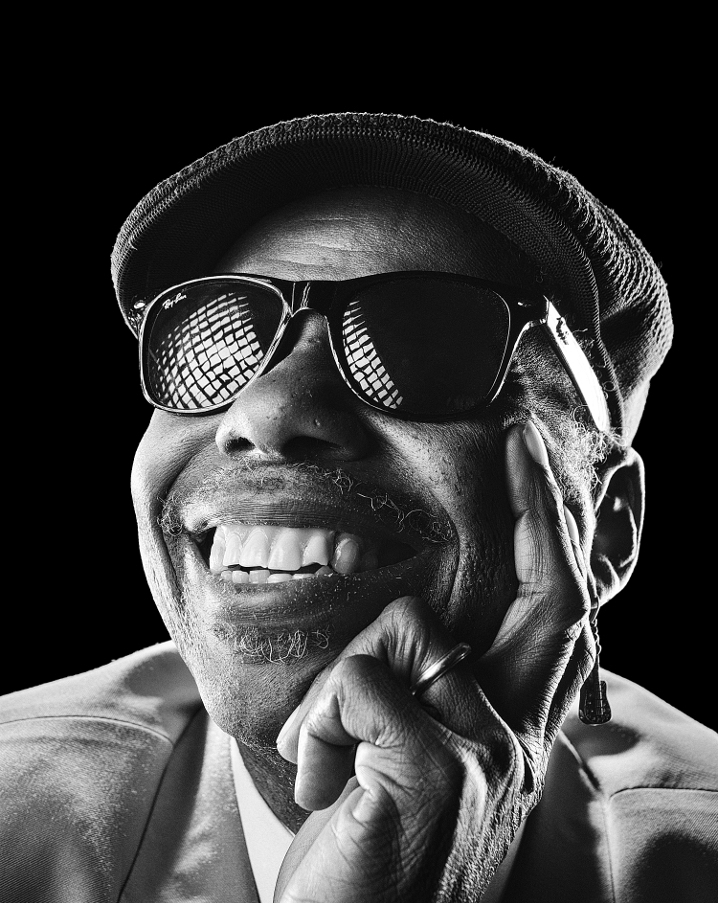Blues Route: Walter “Wolfman” Washington Goes Acoustic

The jury may still be out on whether an old dog can learn new tricks, but it’s now been confirmed that an old wolf certainly can. When Walter “Wolfman” Washington, the 74-year-old New Orleans singer and guitarist, was getting ready to make his latest album, he asked his producer, Galactic’s Ben Ellman, what he had in mind. Ellman took the veteran performer by surprise: He wanted Washington to venture out of his comfort zone of electric blues and R&B.
“He asked me: ‘How would you like to do an acoustic recording?’” Washington says. “I said, ‘I just don’t know what material I’m gonna have.’ But Ben said, ‘Don’t worry about that. I’m gonna get you some.’” Washington then asked the producer who they could get to play on the sessions. “Don’t worry about that either,” Ellman told him. “I’ll get all the musicians together. All you have to do is show up.” Washington not only showed up, but also killed it. My Future Is My Past (Anti-) is unlike any other album Washington has cut during his five-plus decades in the business. Several of its 10 tracks are stripped down to duo or even solo configurations; the production emphasizes Washington’s intimate baritone vocal delivery, recorded close sans much ornamentation. Guests do step in, but they’re just there to augment: Irma Thomas shares a duet with Washington on “Even Now,” which also features the album’s standby rhythm section of Galactic drummer Stanton Moore, bassist James Singleton and pianist David Torkanowsky. Fellow New Orleans mainstay Jon Cleary contributes keyboards to a couple of tracks, including “I Cried My Last Tear,” written by Allen Toussaint. (The song was previously recorded by Washington’s late cousin, NOLA R&B legend Ernie K-Doe.) And Ivan Neville adds his Fender Rhodes to “She’s Everything to Me,” co-written by Doc Pomus and Dr. John.
But throughout, the focus remains on the star of the show. “As long as I’ve known him, I’d never seen him play acoustic,” says Ellman, who worked with Washington previously on Galactic’s 2010 Ya-Ka-May album. “So that was the agenda. The context of just him and an acoustic guitar opened up these possibilities. I loved all that space he commanded; there’s so much intensity within that space. There are no funk songs, nothing super swingy. The biggest challenge of this record was to not go there.”
Washington’s reimagining of “What a Diff’rence a Day Makes,” a standard written in 1934 but best known from singer Dinah Washington’s 1959 hit, is a clear highlight. For this one, Washington is accompanied only by Singleton’s bass and Mike Dillon’s vibraphone and percussion. Another standout is “I Just Dropped by to Say Hello,” a song associated with jazz singer Johnny Hartman. Ellman says that Hartman’s warm and rich vocal style, and the Muddy Waters album Folk Singer—which found the blues icon working in an acoustic setting—served as inspirations for My Future Is My Past.
For Washington, the experience was refreshing and rejuvenating. “I enjoyed it,” he says about the making of the album. “I was mostly into funk and blues, but to record something like this, man, is really a treat for me. I’ve been wanting to do it for the longest time.”
Most fans who’ve seen Washington perform in recent decades have likely experienced him fronting the Roadmasters, his longtime stage band. But he was already well into his career by the time he teamed with them. Washington was in his teens when he began playing behind New Orleans hitmaker Lee Dorsey. “That period in my life was definitely a thrill for me,” Washington remembers. “I had my first professional gig at [Harlem’s] Apollo Theater. I was playing little local clubs, making like 10 dollars for a gig, so when my mama told me I was able to go to New York, I said, ‘Oh, man, this is gonna be something else!’ We just took over the hotel we were staying at; it was my first time in New York, so I wasn’t going to sleep!”
After that, Washington turned pro. “I saw my house three times in two years,” he says. It was during this period that he took on his nickname. “At that time, I had the nickname Wah- Wah,” he says. “I’d be going around challenging all the guitar players: ‘Can you play like this?’ Then I told them what my nickname was and they said, ‘No, that’s not cool enough. We just gonna start calling you Wolf.”
Washington accompanied fellow New Orleans artist Johnny Adams for 20 years and played with Thomas and others but, finally, in the early- ‘80s, he decided it was time to become a frontman. “I was just an unknown guitar player. I was basically on the road, playing smaller clubs,” he says. “You really didn’t get a chance to get recognized. I came back home and started playing [with my own band], and that’s when people started recognizing who I was.”
Ellman was one of those hometown fans who took notice. “I came to New Orleans in ‘89, from California, and I saw Walter play at the Maple Leaf [club], where he was playing every Saturday with a full band with a horn section. I was just totally floored,” he says. “I thought, ‘I can’t believe that this exists in the world.’ New Orleans knew, but the world didn’t know. He’s always been a dude around New Orleans who’s had an amazing band. He’s been a working musician constantly. He’s really a New Orleans treasure.”
This article originally appears in the September 2018 issue of Relix. For more features, interviews, album reviews and more, subscribe here.



















